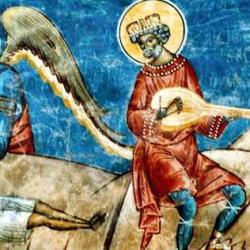In a 1985 article in Theology Today , James L. Mays notes how in Psalm 22 David is first surrounded by a demonic, bestial community to a community of friends, God-fearers, afflicted, and lowly, a group that is qualified as the “seed of Jacob”:
“the group who celebrate his deliverance with him have a theological spiritual identity. They are not simply family, friends, and neighbors, a company constituted by natural and accidental relations. They are brothers (v. 22) in a religious sense. All the different designations refer to this fraternal company: ‘fearers of the Lord’ (w. 23, 25), ‘seekers of the Lord’ (v. 26), ‘the lowly’ (Hebrew ’ ânâwîm , RSV ‘afflicted’ or ‘poor,’ v. 26), ‘descendents of Jacob/Israel’ (v. 24). This last designation does not mean that Israel as a nation is the lowly, but rather that the lowly, seekers, fearers are the true Israel, the real congregation who live by the praise of the Lord.”
David is among the lowly in order to form a society of the lowly: “The language of the hymn reflects a group who without separating themselves from the national society in a social way are thinking and speaking about themselves and their relation to God in a way that is beginning to redefine what it means to be Israel. They are the people who in an intentional and public manner ‘commit their way to the Lord,’ the stance for which the figure was scorned and mocked (w. 7-8). The figure is by self-understanding and confession one of the lowly, an ‘ani . It is not his affliction that has made him a lowly one, but rather he has undergone his affliction as one of the lowly.
In the final analysis, the lowliness and affliction of the lowly King is not a reason for scorning Yahweh’s favor to him. On the contrary, the affliction provides the occasion for Yahweh to demonstrate that favor: “People despise the lowly in his affliction. They take his affliction as a reason to scorn dependence on the Lord (w. 6-8). But the Lord makes the affliction an occasion for giving a signal that it is the lowly in whom he delights. So the company of brothers in faith celebrate not only the salvation of the figure, but the good news for them in his deliverance. The satisfaction they find in the todah meal is far more than physical; it nourishes their spirit. (Note the connections with Isa. 55:lff.) The salvation of the figure is the ground for faith for all the lowly.”
The result of this re-constitution of an Israel of the afflicted will be global faith. In the last part of the Psalm, David expresses the hope that “Everyone—everywhere, of every condition, in every time—will join in the worship of those who recognize and rejoice that universal sovereignty belongs to the Lord. This will all take place through the proclamation of the salvation of the afflicted one as the righteousness (v. 31 sedaqà , RSV ‘deliverance’) of God. That deed of righteousness will become the basis and content of the nations’ worship; they will ‘remember,’ that is, evoke an event of the past as the significant reality of the present.”
Even those who are “going down to the dust” and the one who cannot “keep his soul alive” will “eat and worship” (v. 29). This is a remarkable hope, since several Psalms question whether the dead praise God. Psalm 22 says that they do, and this is likely the prophetic hope fulfilled in Matthew 27:52-53, where the saints rise to join those who are in the holy city.
Mays concludes that the Psalm “interprets Jesus’ passion and resurrection as a theodicy for those who commit their Way to the Lord. The Gospel accounts make it very clear that he suffered and died as one of the ‘lowly.’ In the psalm, it is the dying of one who trusts in the Lord that raises the question about God, and it is his salvation that leads to the knowledge that God ‘has not despised or abhorred the affliction of the afflicted’ (a very real possibility to Old Testament people and to iftoderns). Jesus’ enactment of the scenario includes the affliction to death, and is ground for knowledge that whatever the anguish caused by the conflict of faith and experience may mean, it does not mean that God has failed those who cry to him. For the lowly, the passion and resurrection Of Jesus is a justification of God in whom they trust and a vindication of their trust.”











